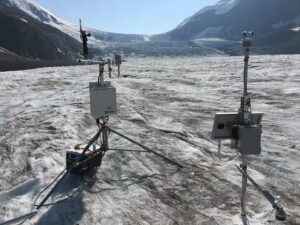More than 500 wildfires were still burning in B.C. in September, with the Yukon, Alberta, Ontario, Quebec, and parts of the Atlantic provinces all experiencing one of the worst fire seasons in history. Globally, wildfires in the United States, the United Kingdom, Spain, Portugal, Greece, Sweden and Australia are burning at an alarming rate.

Ash and soot from the western wildfires are coating the Athabasca Glacier in the Rocky Mountains. Credit: Greg Galloway
According to John Pomeroy, Canada Research Chair in Water Resources and Climate Change and director of the University of Saskatchewan-led Global Water Futures Program (GWF), this is a horrific year for wildfires not only in Canada but around the world.
Read more at: https://phys.org/news/2018-09-wildfire-season.html


